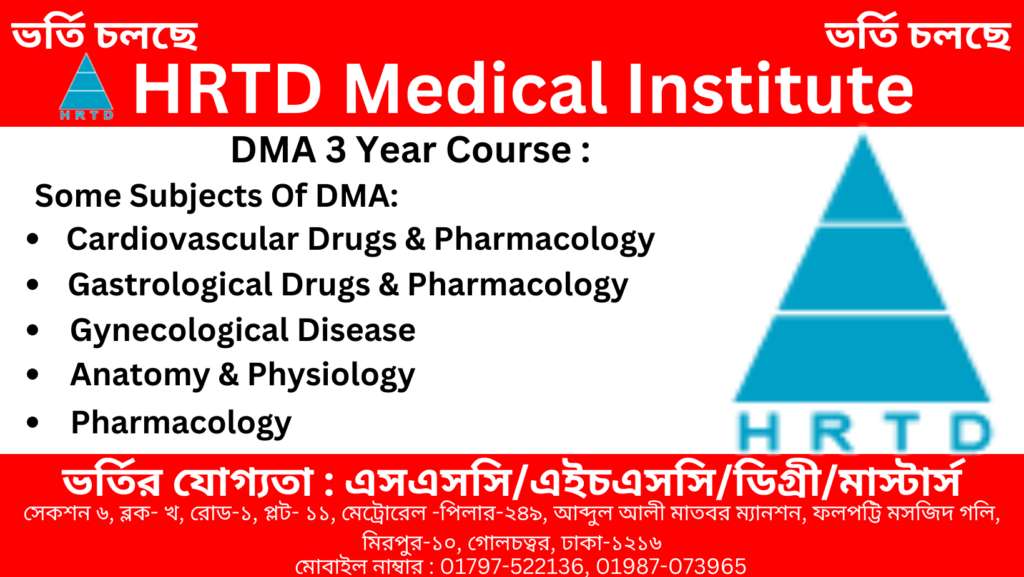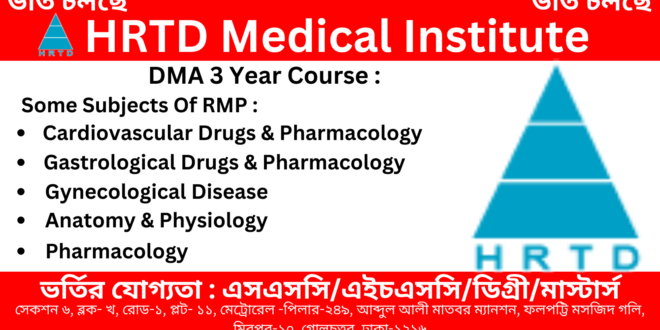DMA Course 3 Years in Dhaka
DMA Course 3 Years. Mobile No. 01987-073965, 01797-522136. DMA Course 3 Years Tk 142500/-, DMA means Diploma Medical Assistant. Admission Fee Tk 20500/-, Monthly Fee Tk 3000/Month. 24 Subjects in 6 Semesters. The Subjects are Human Anatomy and Physiology, Pharmacology, Microbiology, Hematology, Pathology, Practice of Medicine, Medical Diagnosis, Histology and Cytology, etc. Diploma Medical Course is available at HRTD Medical Institute. We provide the best teaching, the best environment, and the best education and training for our students with the help of Models, Monitors, and some other medical devices. Our students never remain unemployed.
- Course Summary :
- Total Subjects : 24
- Total Exam Marks : 2400
- Total Semester: 6
1’st Semester :
- Anatomy & Physiology…………………….….……Marks-100
- Gen. chemistry & Pharmacology………………Marks-100
- First Aid & Practice Of Medicine-1……………Marks-100
- Study of OTC ……………………………………….……Marks-100
- Hematology & Pathology……………………………Marks-100
2’nd Semester :
- Orthopedic Medicine…………………………..…..…Marks-100
- Biochemistry…………………….………..…………………..Marks-100
- Medical Diagnosis……………………..………………..Marks-100
- Cardiovascular Anatomy & Physiology………..Marks-100
- Surgery & Antimicrobial drugs………………………Mark-100
3’rd Semester :
- Orthopedic Anatomy & Physiology…….…..Marks-100
- Practice of Medicine 2 &3…………………………………Marks-100
- Microbiology & Pathology…………..……….….Marks-100
- Practice Of Neuro medicine………………….…..Marks-100
4’th Semester :
- Human Anatomy & Physiology-2………………………….Marks-100
- Neuro Anatomy & Physiology……………………………………………Marks-100
- Histology & Cytology…………………………………………..Marks-100
- Hepatology……………………………………..…………Marks-100
5’th Semester :
- Pharmacology-2……………………………..…………Marks-100
- Practice of Medicine-2…………………..………….Marks-100
- Surgery-1……………………………………………………Marks-100
- General Pathology………….…….…Marks-100
6’th Semester :
- Cardiovascular Drugs & Pharmacology….…Marks-100
- Gastrological Drugs & Pharmacology……….Marks-100
- Essential Drugs & Pharmacology………….…..Marks-100
- Gynecological Disease…………………………..……Marks-100

DMA Course In Bangladesh
DMA Course In Mirpur
- Cost Summary :
- Total Course Fee : 142,500 /-
- Admission Fee :20,500 /-
- Monthly Fee : ( 36 × 3000 )
- Exam Fee : (6) 14,000 /- In Total.
Practical Classes :
Auscultation, Heart Beat, Heart Rate, Heart Sound, Pulse, Blood Pressure, Respiratory Rate, Inhaler, Rota Haler, Nebulizer, Blood Oxygen, Blood grouping, Cyanosis, Blood Glucose (Diabetes), Body Temperature, Dehydration Test, Edema Test, IM Injection, IV Injection, Saline Infusion, Cleaning, Dressing, Bandaging.
Class Time for Diploma Medical Assistant Course
Weekly Class 3 hours. There are two class systems. System for Job holders and System for Regular Students. For Regular Students Friday 1 hour, Saturday 1 hour, and Monday 1 hour. For Job holders, Friday is 3 hours, or Monday is 3 hours. Morning Shift 9:00 am to 12:00 pm, and Evening Shift 3:00 pm to 6:00 pm.
Anatomy and Physiology for DMA Course
Anatomy and Physiology is an important subject for medical science. The study of Body Structure and its functions is Anatomy and Physiology. Here we discuss the systems of the Human Body and its Organs, Tissues, and Cells. The systems of the Human Body are the Nervous System, Digestive System, Respiratory System, Circulatory System or Cardiovascular System, Skeletal System, Muscular System, Endocrine System, Immune System, Lymphatic System, Integumentary System or Covering System, and Urinary System.
Pharmacology for Diploma Medical Assistant Course
The study of Drugs and Medicine is called Pharmacology. Drugs are chemicals that can react with cells, tissues, and organs of the body. Here we discuss group-wise drugs and their medicines. Common Groups of Drugs are Pain Killer Drugs, Anti Ulcer Drugs, Anti Vomiting Drugs, Anti Viral Drugs, Laxative Drugs, Motility Drugs and Antimotility Drugs, Bronchodilator Drugs, Antibiotic Drugs, Anti Fungal Drugs, Anti Thrombotic Drugs, Anti Protozoal Drugs, Anthelmintic Drugs, Anti Hypertensive Drugs, Beta Blocker Drugs, Calcium Channel Blocker Drugs, ACE Inhibitor Drugs, Hemostatic Drugs, Analgesic Drugs, Antipyretic Drugs, Steroid Drugs, NSAID Drugs, CNS Drugs, Neuropathic Pain Keller Drugs, Spasmodic Drugs, etc.
First Aid for Diploma Medical Assistant Course
First Aid is an important subject for all courses. It is very important for the RMP Course. Here we discuss Shock, Classifications of Shock, Causes of Shock, Stages of Shock, Clinical Features of Shock, Hypovolemic Shock, Cardiogenic Shock, Neurogenic Shock, Traumatic Shock, Burn Shock, Electric Shock, Psychogenic Shock, Anaphylactic Shock, First Aid of Shock, Management of Shock, First Aid of Cut, First of Snake Bite, First Aid of Accidental Injury, etc.
Study of OTC Drugs for Diploma Medical Assistant Course
OTC is the short form of over-the-counter. That is OTC Drugs are over-the-counter drugs. The study of OTC Drugs is important for RMP Courses. These Drugs can be sold or purchased without any prescription from Registered MBBS Doctors. These Drugs are Emergency and Safe for the patients. The study of OTC Drugs improves the quality of practice. Some OTC Drugs are Paracetamol, Albendazole, Ascorbic Acid, Calcium, Multivitamins, Vitamin B Complex, Omeprazole, Oral Rehydration Salt, Salbutamol, Mebendazole, Neomycin, Gentamycin, Bacitracin, etc.
Hematology and Pathology for Diploma Medical Assistant Course
Hematology and Pathology are important Subjects for Medical Science. The study of Blood is called Hematology and the Study of Pathos is called Pathology. In Hematology and Pathology, we discuss blood cells, their morphology and functions, Blood Diseases, Common Pathos and their pathogenesis, Atrophy, Hypertrophy, Metaplasia, Gangrene, Pathological Tests like TC, DC, ESR, Hemoglobin Percentage, etc.
Microbiology and Antimicrobial Drugs for DMA Course
The Study of Microorganisms is called Microbiology. Microorganisms are the smallest living beings that cannot be seen without a microscope. The Drugs that are used for the treatment of Infectious Diseases are Antimicrobial Drugs. Microorganisms are Bacteria, Protozoa, Fungus, and Virus. Antimicrobial Drugs are Antibiotic Drugs ( Antibacterial Drugs), Anti Protozoal Drugs, Anti Fungal Drugs, and Anti Viral Drugs.
Practice of Medicine for DMA Course
The study of Disease and Treatment is called the Practice of Medicine. Actually, the Practice of Medicine means the use of medicine for treatments. This subject is important for a Rural Medical Practitioner. This subject discusses some common diseases. The points of discussion for the Practice of Medicine are the Definition of Disease, Causes of Disease, Clinical Features of Disease ( Symptoms and Signs), Investigation of Disease, Treatment of Disease, Complication of Disease, and Advice for the Patients.
Common Cardiovascular Problems
Common Cardiovascular Problems are an important issue nowadays. Common Cardiovascular Problems are Hypertension, Hypotension, Postural Hypotension, Tachycardia, Bradycardia, Abnormal Pulse, Heart Burn, Deficiency of Saturated Oxygen, Abnormal Heart Sound, Increase Bad Cholesterol, Heart Failure, Edema, etc. These problems are discussed as elaborately as possible. Bad Cholesterol are LDL, VLDL and TG.
Common Pediatric Problems
Common Pediatric Problems: Pediatric Respiratory Problems, Pediatric Digestive Problems, Pediatric Skin Problems. These are discussed in the Rural Medical Practitioner Course. Pediatric Respiratory Problems are Pediatric Pneumonia, Pediatric Nasal Congestion, Pediatric Asthma, etc. Pediatric Digestive Problems are Rotavial Diarrhea, Pediatric Flatulence, Pediatric Abdominal Discomfort, Pediatric Vomiting, and Pediatric Constipation. Pediatric Skin Problems are Tineasis and Oral Candidiasis, especially Tinea Capitis, and Tinea Crusis. Tinea is a fungus that causes Tiniasis. So, Tineasis is a fungal infectious disease. Candida is also a fungus and can cause oral candidiasis.
Gastrology for Diploma Medical Assistant Course
The study of the Gastro ( Stomach) in Medical Science is called Gastrology. Gastrology for RMP is an important subject. This Subject discusses the important part of Gastrointestinal Anatomy, Gastrointestinal Drugs, and Medicines, and Gastrointestinal Disease as elaborately as possible.
Common Points of Gastrointestinal Anatomy and Physiology are Anatomy of Tongue, Anatomy or Oral Cavity, Anatomy of the Esophagus, Physiology of Tongue, Physiology of Evola, Physiology of Epiglotis, Anatomy of Stomach, Anatomy of Small Intestine, Anatomy of Large Intestine, Anatomy of Cecum and Appendix, Physiology of Appendix, Digestive Sphincters, etc. Common Gastrointestinal Drugs are Anti Vomiting Drugs, Anti Ulcer Drugs, Motility Drugs, Antimotility Drugs, Laxative Drugs, Anti Diarrheal Drugs, Some Antimicrobial Drugs for Gastrointestinal Infectious Diseases. There are 6 Sphincters in the human digestive system.
Common Gastrointestinal Problems and Diseases are Vomiting, Nausea, Abdominal Discomfort, Hyperacidity, Gastric Ulcer, Duodenal Ulcer, GERD, Diarrhea, Dysentery, Amebic Dysentery, Bacillary Dysentery, Cholera, Constipation, etc.
Teachers for Diploma Medical Assistant Course
- Dr. Sakulur Rahman, MBBS, CCD
- Dr. Suhana, MBBS, PGT
- Dr. Amena Afroze Anu, MBBS, PGT
- Dr. Lamia, MBBS
- Dr. Mahinul Islam, MBBS
- Dr. Sharmin Ankhi, MBBS, PGT
- Dr. Jannatul Aman, MBBS, PGT
- Dr. Turzo, MBBS, FCPS (Part 2)
- Dr. Benzir, MBBS, FCPS (Part 2)
- Dr. Disha, MBBS, FCPS (Part 2)
- Dr. Tisha, MBBS, PGT Medicine
 MATCDHAKA – Medical Assistant Training Centre in Dhaka Pharmacy, Veterinary, Dental, Nursing, Pathology, Physiotherapy and Homeopathy Training Institute in Dhaka
MATCDHAKA – Medical Assistant Training Centre in Dhaka Pharmacy, Veterinary, Dental, Nursing, Pathology, Physiotherapy and Homeopathy Training Institute in Dhaka





One comment
Pingback: Best DMA Courses in Bangladesh. Mobile No. 01987-073965, 01797-522136.